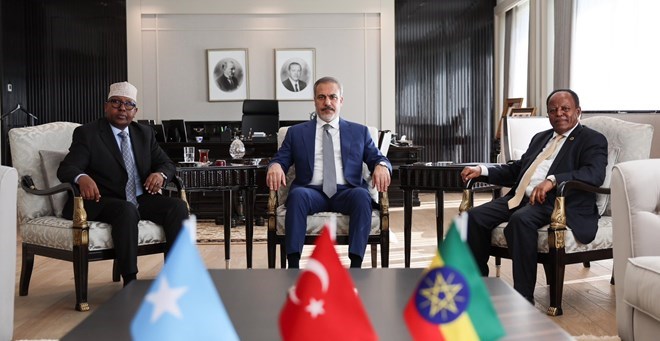
Friday September 27, 2024

Somali Foreign Minister Ahmed Moallim Fiqi (left), Turkish Foreign Minister Hakan Fidan (center), and Ethiopian Foreign Minister Taye Atske Selassie (right) during a meeting in Ankara
Mogadishu (HOL) — Somalia's Foreign Minister, Ahmed Moallim Fiqi, has ruled out any immediate prospects for direct negotiations with Ethiopia regarding their maritime dispute, citing Ethiopia's refusal to renounce its controversial agreement with Somaliland.
The dispute centers on a deal made in January 2024 between Ethiopia and Somaliland, in which Somaliland agreed to lease 20 kilometres of its coastline to Ethiopia for 50 years. The agreement would give Ethiopia, a landlocked nation, long-sought sea access for commercial and naval purposes. In return, Ethiopia was expected to recognize Somaliland's independence, though Addis Ababa has not officially confirmed this.
"This reckless move undermines Somalia's territorial integrity, and we see no indication that Prime Minister Abiy Ahmed is prepared to reverse course and engage in any meaningful dialogue to resolve the issue," Fiqi said.
Amid these tensions, Turkish Foreign Minister Hakan Fidan met separately with both Ahmed Moallim Fiqi and Ethiopian Foreign Minister Taye Atske Selassie at the Turkish House in New York on the sidelines of the United Nations General Assembly.
Turkey has emerged as a key mediator in the Somalia-Ethiopia dispute, having already facilitated two rounds of unsuccessful indirect talks in July and August. However, the third round, initially scheduled for September, has been postponed indefinitely. Fidan cited the intricate nature of the negotiations as the reason for the postponement. However, senior Somali officials confided to Hiiraan Online that the real sticking point was clear: nothing could move forward unless Ethiopia disavowed the controversial MoU at the heart of the dispute.
The United States is also playing an active role in monitoring the situation. U.S. Ambassador to Somalia, Richard Riley, stressed the need for a swift resolution, stating that the U.S. is working with international partners, including Turkey, to prevent the situation from escalating further.
The maritime deal has threatened to spiral into a regional crisis, with middle powers lining up behind either Mogadishu or Addis Ababa. Somalia views the agreement as a direct violation of its sovereignty, while Somaliland, which declared independence in 1991 but remains unrecognized internationally, continues to assert control over the disputed territory.
Minister Fiqi drew attention to the conflicting nature of Ethiopia's involvement in Somalia. "It's a paradox," he remarked. "On one hand, Ethiopian forces are here under the pretext of peacekeeping, supposedly supporting stability in Somalia. Yet, on the other hand, Prime Minister Abiy Ahmed's government is actively violating our sovereignty through its backdoor agreements with Somaliland."
Yet, Fiqi made it clear that Somalia has yet to abandon diplomacy entirely. With a trace of reluctance, he acknowledged that the door remains open — barely. "We're still giving Ethiopia a chance to walk back from this reckless agreement," he said. "If they nullify it and restore the status quo before January 1st, there's room to talk."